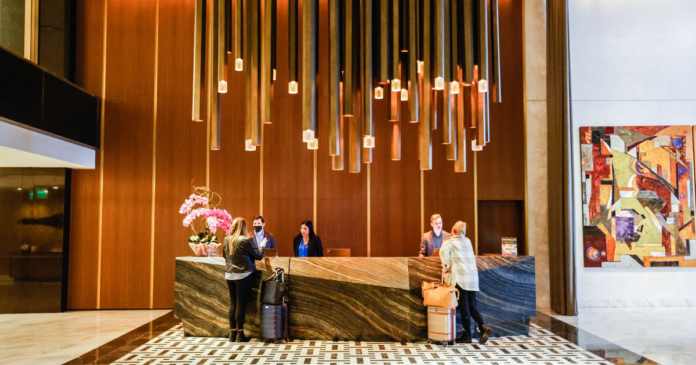In November 2020, eight months after COVID-19 swept across the country, a new luxury hotel opened in downtown Dallas.
Thompson Dallas, part of a $463 million restoration of the National, a long-vacant office tower, got off to a slow start.
“It was like a soft opening that lasted until early 2021,” said Philip Todd, partner at Todd Interests, the Dallas real estate firm that developed the project.
The hotel had zero corporate accounts, he said, but now has almost 100. Occupancy at the 219-room hotel has been climbing steadily, too, even with high-priced rooms.
The lobby of the 219-room Thompson Dallas hotel that opened during the pandemic. (Lola Gomez / Staff Photographer)
“We’re 100% sold out at almost $600 on the rate,” Todd said about bookings for Thursday. “For Friday, we’re 98% sold at almost $700 a night.”
Three years after the pandemic led to over $6 billion in lost room revenue for Texas hotels, the state’s lodging industry has recovered in a big way.
Third-quarter revenue hit $3.75 billion, the highest ever for the three-month period that ended in September — and 20% higher than before the pandemic, according to estimates from Source Strategies, a Texas hotel consulting firm.
Occupancy is still lagging behind pre-pandemic levels, in large part because business travel has not come back entirely. In Dallas, hotels were 62% occupied in the third quarter compared with almost 65% three years ago.
Higher room rates have made up for the shortfall.
In Dallas, third-quarter hotel revenue was nearly $673 million, up from $582 million for the same period in 2019, Source Strategies estimated. The average daily rate in Dallas was $118 a night from July through September, 8.3% higher than before the pandemic — and almost 16% higher than in 2021.
“Our growth has been predominantly about rates,” said Mayur “Mike” Patel, managing partner at Prosper Hospitality, which owns 27 economy to mid-scale hotels in North Texas. “We’re able to charge rates we’ve never been able to charge.”
Hotel taxes collected by the state show how the industry has rebounded. For fiscal year 2022, which ended in August, Texas collected nearly $700 million in hotel occupancy taxes, according to data from the Texas Comptroller. That’s $212 million more than the year before and 10% more than before the pandemic.
The hotel recovery also appears to be accelerating: From September through December, statewide hotel tax collections rose 24% compared with a year earlier. That’s nearly double the growth rate for sales taxes in the state.
“People want to come here and experience Texas,” said David Sher, general manager at Fairmont Dallas, where rates are up over 15%.
With scores of construction projects and big cranes dotting the sky, Dallas is booming and that’s part of the attraction, he said: “You can see the investment, and people just recognize it.”
The employment picture has strengthened, too. Texas’ accommodation sector was crushed by the pandemic’s health threats and economic lockdowns. Many hotels, including Fairmont Dallas, effectively shut down for several months.
In April 2020, the hotel and lodging industry lost 42% of its jobs compared with a year earlier. That dwarfed the 9.6% reduction in total employment in the state, and it took a lot longer for hotels to catch up.
In December, the accommodation sector finally surpassed its pre-pandemic job numbers — about a year after Texas’ total employment topped the threshold.
Texas’ hotel and lodging industry added nearly 26,000 jobs last year, roughly seven times more than the average annual gain in the decade before the pandemic.
And the 24.3% growth in accommodation jobs was higher than any other sector in Texas, including the one with oil and gas workers.
“It’s a fantastic recovery story,” said Paul Vaughn, senior vice president at Source Strategies. “Not all markets are recovering at the same rate, but this has happened much faster than many analysts thought.”
Prosper Hospitality didn’t shut down hotels for the pandemic, Patel said, and revenue topped 2019 levels by 2021.
Its properties, which include Motel 6, La Quinta and Super 8 brands, are generally located along highways and many have exterior entrances, which appealed to customers who wanted to limit contact during the pandemic. The company also doesn’t depend as much on convention business.
During the pandemic, it invested in improvements, Patel said, and that led to being able to charge higher rates in the recovery. “When that demand surge came through, our properties were well positioned to take advantage,” he said.
Dallas remains an affordable destination, in part because hotel prices have not grown as much as in other places. Dallas’ average rates are up 18% year-over-year while national rates are up over 50%, according to Hopper, a travel site that closely tracks trends in the industry.
On the Hopper app, the average price of a Dallas hotel was $168 a night compared with $212 nationally, said Hayley Berg, an economist at the site.
That probably contributes to another development: “Something else we’re seeing is the relative increase in the popularity of Dallas itself,” Berg said.
Based on January hotel bookings on the Hopper app, Dallas’ market share has grown by just over a third compared with a year ago, she said.
“There is certainly something unique about Dallas and the surge in demand,” Berg said.
Visitors to Dallas tend to have shorter stays and book their reservations closer to departure, according to Hopper data.
At Fairmont Dallas, “Large groups used to book six months in advance,” Sher said. “Now we’re seeing a month to six weeks” in advance.
That makes it harder to project revenue, and the Fairmont has over 72,000 square feet of meeting space so it relies heavily on attracting business groups.
A new Dallas convention center is in the works, but it’s at least five years away, said Craig Davis, CEO of VisitDallas, the group that promotes conventions and visitors business. In the meantime, he pointed to recent growth in hotel revenue that surpassed 2019 levels and noted that Dallas-Fort Worth leads the nation in hotel projects in the pipeline.
Over 20,000 new rooms are coming to North Texas — more than to any other region, according to estimates from Lodging Econometrics.
“We’re forecasting some pretty substantial growth in the next number of years, all the way to 2026,” Davis said.
At Thompson Dallas, Todd pointed to a big increase in corporate business, including Fortune 500 companies and small firms. More leaders want to get their employees together in person, both to work out business strategies and to celebrate their success.
“People are just a little tired of all the Zoom meetings,” Todd said.
Hotel business surges in D-FW and Texas as travel recovers and pandemic fades
Recent Comments
on Army vs. Coastal Carolina live stream, how to watch online, CBS Sports Network channel finder, odds
on AL Rookie of the Year Julio Rodriguez Spreads Joy and Sportsmanship to the Youth of Loma de Cabrera
on After UFC Fallout, Conor McGregor Offers a Valuable Piece of Advice to Free Agent Francis Ngannou
on Dubai International Airport sees 41.6 million passengers in first half of year, more than in 2019
on Devout athletes find strength in their faith. But practicing it and elite sports can pose hurdles
on Despite strong Lunar New Year holiday data, consumer spending in China isn’t roaring back just yet
on Dave Portnoy: Taylor Swift’s security should ‘drag Kim Kardashian to jail’ if she attends Eras Tour
on CONCEPT ART: New Details Revealed for Disney Cruise Line Lookout Cay at Lighthouse Point Destination
on “Completely Knocked Me Out”: Rob Lowe Recalls Boxing Match With Tom Cruise On 1983 Brat Pack Classic
on CBS Sports, Serie A announce new TV rights deal; Paramount+ to air over 400 Italian soccer matches
on Cam Newton’s Violent Public Incident Draws Hilarious Reaction From 3x All-Star: “Where Do I Sign Up
on Boston College vs. Army live stream, how to watch online, CBS Sports Network channel finder, odds
on Angel Reese Launches Foundation Dedicated To Empowering Women Through Sports & Financial Literacy
on A weaker dollar, skyrocketing prices and ‘record’ visitor numbers: Good luck in Europe this summer




